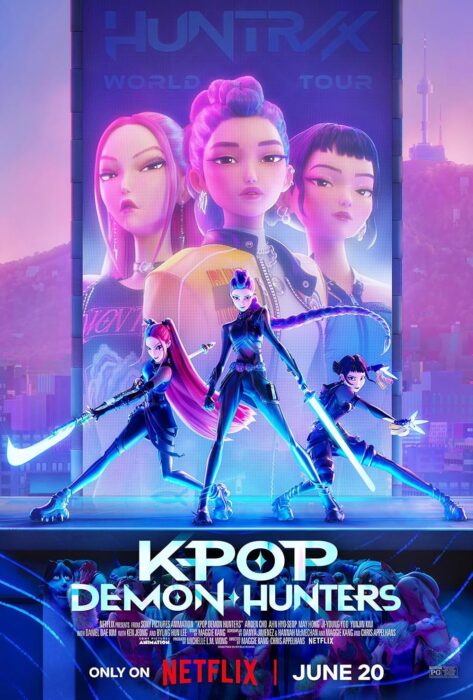‘K-Pop Demon Hunters’ Pits Singing Heroines vs. Monster Idols
If you don’t want to have a handful of very catchy K-pop tunes (written originally in English) stuck in your head for a week straight, do not watch K-Pop Demon Hunters.1
I’ve been waking up in the middle of the night with my internal boombox playing “Soda Pop” and “Golden” without my permission. I told myself when I woke up that I would not listen to the soundtrack again the following day. (Spoiler: She listened to it again.)
Regardless of how catchy the music is, how does this film square up with biblical depictions of spiritual warfare? Is there enough common grace in a film about demon hunting to make it watchable? And more importantly—should you let your kids watch this flashy, animated musical? Let’s dig in!
Note: This review contains spoilers.
Editor’s note: If you hadn’t already heard of this movie, you will. Netflix is already planning “two sequels, a short film, and a stage musical” to build out the K-Pop Demon Hunters franchise, per The Wrap on July 31, 2025.
How does the demon hunting compare to biblical spiritual warfare?
This film is more consistent with Korean folklore surrounding demons and evil spirits. In Korean stories, demons are sometimes depicted as completely evil spirits without any hope of redemption, mischievous sprites similar to fae, or a creature that used to be human but is made an immortal slave of another more powerful demon (like Satan). These demons can sometimes be killed with a physical weapon like a magical sword.
K-Pop Demon Hunters is certainly not unique in its approach to this storyline. Many other K-dramas tackle similar demon-slaying (or saving) plots in shows like The Uncanny Counter (where soul-stealing demons are slayed by hunters who run a noodle shop) or My Demon (where a once-human demon falls in love and eventually becomes human again).
K-Pop Demon Hunters actually has both of those elements as well as a Satan-like creature. There are demons that appear to be entirely evil and have the look of a monster. Then there are demons that look human and have a tragic backstory of being drawn into the demon-realm through weighty sin and shame. Lastly, there is the ruler of the demon-realm who sends the other demons out on mission to steal human souls so that he may feast on them.
Obviously much of this is entirely fictional and based more in Eastern folklore than anything. We can see some roots in Buddhism since entities that dwell in dark realms are believed to have the ability to improve their karma and situation.
But K-Pop Demon Hunters doesn’t strictly follow the teachings of Buddhism. First of all, the fact that at least some demons are eternally evil and depicted as strictly monstrous is more consistent with the Bible than Buddhism. The inclusion of a Satan-type character and the concept of sin is also more in alignment with Christianity. That’s where the similarities of this worldbuilding end.
The Korean habit of depicting demons as physical and having the ability to be killed with a magic sword is entirely fictional and, arguably, metaphorical. The use of a magical sword is often used to symbolize power, protection, and honor.
The idea that a human could become a demon and then later be rescued from that position of slavery has roots in the Buddhist concept of karma, but it also may just be a literary device for overcoming human depravity (a word used once in K-Pop Demon Hunters). It’s typically only in the West that people ignore the existence of sin. Thankfully, South Korea does not seem to have that problem even if Buddhism doesn’t include a belief in sin.
(It’s important to note that modern day South Korea is 31 percent Christian and only 17 percent Buddhist.)
Does K-Pop Demon Hunters have enough common grace to make it watchable?
I can’t answer this question for you, but I can tell you what I’ve decided about watching KDH. I also know a number of Christians who have enjoyed this film and the biblical themes that come together at the end of the movie. But I have also heard of people who find the spiritual warfare aspects to be too close to home to be entertaining. I think there is certainly room for people to make their own choices here and agree to disagree when necessary.
So what are the thematic elements of the story that align with a Christian worldview?
First, although there is no source mentioned for the “good” magic the hunters are using, the girls are humble, service-oriented, and self-sacrificing. They are a very famous K-pop girl band, and yet their focus when they’re alone is to make sure their fans are protected from dark spiritual forces. Their fame is entirely gained for the purpose of protecting the vulnerable. The film even ends with a very touching moment of the three K-pop stars humbly approaching three young fans in the street just to be kind.
This is a large reason why I’m comfortable with saying the heart of the magic system and characters is more in-line with biblical principles and values than demonic ones. (See my book On Magic and Miracles for a full explanation of how to evaluate a magic system through the lens of scripture.)
Second, the idea that a human could ever become a demon is entirely fictional and not biblical. However, K-Pop Demon Hunters uses this more metaphorically than literally. Where Western media rarely, if ever, uses the words “sin” or “depravity,” K-Pop Demon Hunters is not afraid to use such language or state the obvious flaws and sins of humans. It also presents a great opportunity for a beautiful character full of redemption, confession, and hope.
The weighty sins and shame of very real failure in conjunction with listening to the voice of the Satan character, Gwi-ma, is what pulls a human into the dark realm where they are forced to live as a demon and work as a slave. And no human is without at least some such shame and temptation to listen to that voice. In the end, it’s Rumi’s (the main character) choice to stop hiding her flaws from the people who love her that gives her the courage and strength to face Gwi-ma and save their fans.
In a beautiful moment of self-sacrifice ending in the death of a beloved character, Gwi-ma is slain, the fans are protected, and Rumi is no longer ashamed to admit she isn’t perfect. There may be no mention of Christ, but in a secular film, this gets as close to the gospel as some of the best displays of common grace. In fact, it gets so close that some Christian viewers have wondered if one of the screenwriters may actually be a believer.
Should you let your kids watch K-Pop Demon Hunters?
Again, I can’t tell you what you should do. You know your kids, their ages, sensitivities, and maturity. I did end up letting my kids watch this, but my husband and I both watched it first and discussed it together before our two younger kids were allowed to see it. We also had a discussion with the kids about the differences between how the demons and spiritual warfare were presented in the film versus scripture before the film started.
After it was over, we discussed the themes and the way we shouldn’t hide our sin in the dark where it can fester and grow. We need the light of the gospel and a loving community to be open and honest with in order to be honest, humble, and overcome temptation. It ended up being a great conversation that all our kids were able to follow and understand. (They are currently 13, 11, and 8.)
One last thing to mention besides magic and spiritual warfare is the use of male objectification a few times throughout the film. Two of the girls ogle a man’s abs in a very obvious and comedic moment. Although I wasn’t thrilled with this part of the film, it’s somewhat resolved later on with a mild degree of turning away from that temptation. This may be another opportunity to talk about objectification of others’ bodies with your kids.
- Marian A. Jacobs wrote this original review July 25, 2025 at her Substack. It’s republished here with permission. ↩































Share your fantastical thoughts.